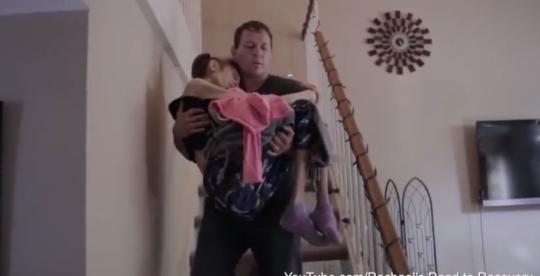A southern California woman suffering from a severe form of anorexia nervosa is publicly pleading for help now that her weight has spiraled out of control.
Rachael Farrokh, who is five-foot-seven and weighs just “40-something pounds” and has battled anorexia for 10 years. The 37-year-old actress posted a video to YouTube, detailing her ordeal and asking for financial donations to help her get the treatment she desperately needs.
“I need your help,” she says in the video. “I’m suffering from an eating disorder. It’s a very severe kind of anorexia.” Farrokh says hospitals in her area have refused to treat her because her weight makes her a “liability.”
Her husband Rod Edmondson quit his job as a personal trainer to be her 24-hour caregiver, she continued, and she’s currently unable to walk on her own.
How did things get so bad? “I wanted to drop a few pounds to get better abs,” she said. But when she lost her job and kept focusing on a painful memory from her past, things “spiraled out of control.”
Farrokh says there’s one hospital across the country that can help her, adding “my chances are very slim.”
Related: Woman ‘Sick’ After Her Anorexia Photo Used In ‘Amazing’ Weight Loss Story
“I’m not one to ever ask for help,” she says. “I need your help, otherwise I don’t have a shot. And I’m ready to get better.”

According to the National Association of Anorexia Nervosa and Associated Disorders, anorexia nervosa has the highest mortality rate of any psychiatric disorder, and only one in 10 people who suffer from an eating disorder receive treatment.
ABC News reports that Farrokh went from 125 pounds to her current bare-bones weight. But how can this happen? Didn’t other people notice and step in to help?
Unfortunately such shocking weight loss is not uncommon with eating disorders, says Samantha DeCaro, PsyD, assistant clinical director at eating disorder treatment facility The Renfrew Center.
She says that people suffering from an eating disorder often hide their early weight loss by pulling away from friends and family and lying about their eating habits. “There’s a lot of secrecy and shame, and they don’t really believe it’s a problem,” DeCaro tells Yahoo Health.
Rachael Farrokh, who is five-foot-seven and weighs just “40-something pounds” and has battled anorexia for 10 years. The 37-year-old actress posted a video to YouTube, detailing her ordeal and asking for financial donations to help her get the treatment she desperately needs.
“I need your help,” she says in the video. “I’m suffering from an eating disorder. It’s a very severe kind of anorexia.” Farrokh says hospitals in her area have refused to treat her because her weight makes her a “liability.”
Her husband Rod Edmondson quit his job as a personal trainer to be her 24-hour caregiver, she continued, and she’s currently unable to walk on her own.
How did things get so bad? “I wanted to drop a few pounds to get better abs,” she said. But when she lost her job and kept focusing on a painful memory from her past, things “spiraled out of control.”
Farrokh says there’s one hospital across the country that can help her, adding “my chances are very slim.”
Related: Woman ‘Sick’ After Her Anorexia Photo Used In ‘Amazing’ Weight Loss Story
“I’m not one to ever ask for help,” she says. “I need your help, otherwise I don’t have a shot. And I’m ready to get better.”

According to the National Association of Anorexia Nervosa and Associated Disorders, anorexia nervosa has the highest mortality rate of any psychiatric disorder, and only one in 10 people who suffer from an eating disorder receive treatment.
ABC News reports that Farrokh went from 125 pounds to her current bare-bones weight. But how can this happen? Didn’t other people notice and step in to help?
Unfortunately such shocking weight loss is not uncommon with eating disorders, says Samantha DeCaro, PsyD, assistant clinical director at eating disorder treatment facility The Renfrew Center.
She says that people suffering from an eating disorder often hide their early weight loss by pulling away from friends and family and lying about their eating habits. “There’s a lot of secrecy and shame, and they don’t really believe it’s a problem,” DeCaro tells Yahoo Health.

